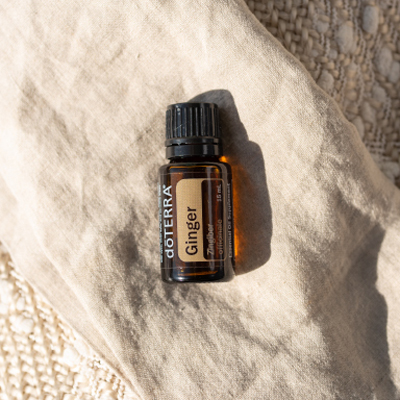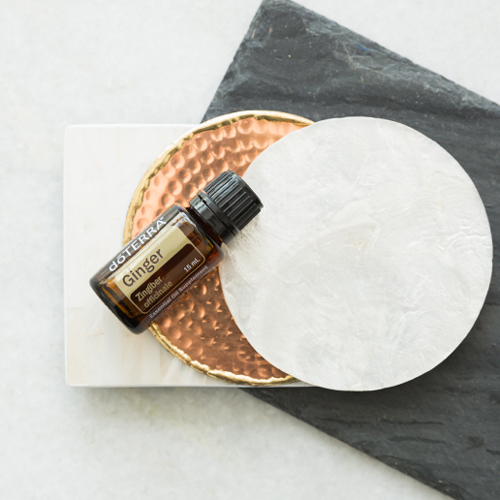Ginger Oil Uses and Benefits
Essential Oil Spotlight
Essential Oil Spotlight



Ginger Essential Oil Product Description
Widely known for adding spice and flavor to many popular dishes, the ginger root has a variety of benefits and uses that reach far beyond the culinary realm. Taken from the underground stem of the ginger plant, Ginger essential oil has warming and soothing properties that make it useful in everyday life. Taken internally, doTERRA Ginger oil can be used to ease occasional nausea and aid in digestion.* With a spicy, fresh aroma, it works well in a variety of diffuser blends. Ginger oil can also substitute for ginger flavoring in your favorite recipes.
Where to Buy Ginger Essential Oil
If you are ready to buy Ginger oil for your personal use, visit our Ginger essential oil page and learn how to order. Sourced from Madagascar, doTERRA Ginger oil is pure, potent, and thoroughly tested to ensure safe aromatic, topical, and internal use. Through CPTG Certified Pure Tested Grade™ quality control, doTERRA preserves the purity and potency of each bottle of essential oil—including doTERRA Ginger oil.
Ginger Essential Oil Uses and Benefits
- For centuries, ginger has been an integral ingredient in many recipes, particularly for Asian dishes. When you want to add the sweet, spicy flavor of ginger to a meal, you can simply use Ginger essential oil in the place of whole ginger in your favorite recipes.It is also very useful for baked goods like ginger snaps, banana bread, pies, and more. If you are looking for a Ginger oil recipe that will satisfy your sweet tooth, take a look at our recipe for Mini Pumpkin Pies. This is the perfect recipe for the holidays, and uses the warm, spicy flavors of Clove, Ginger, and Cassia oil to put a twist on a traditional dessert.
- Because of its soothing properties, Ginger may help reduce occasional nausea when taken internally*—making it a good essential oil to carry with you on-the-go. When you experience occasional moments of nausea, you’ll want a bottle of Ginger oil close by. Just take a drop or two in water to help ease your discomfort.* When you take a long car ride or drive along winding roads, diffuse Ginger oil in the car or place a drop of Ginger in the palm of your hand and inhale to enjoy its calming, soothing aroma. You can also apply Ginger oil topically, diluting with Fractionated Coconut Oil, as part of a soothing abdominal massage.
- Ginger essential oil may help reduce bloating and gas when taken internally.* This benefit can be helpful before a big workout, especially if you are feeling bloated or uncomfortable. Before working out, take a drop or two with water or in a doTERRA Veggie Capsule to reduce bloating.*
- Have you tried adding Ginger essential oil to your diffuser blends? You can diffuse it in the essential oil diffuser of your choice to help create a balanced, grounded feeling. If you feel your energy lagging in the late afternoon, diffuse this essential oil for an extra emotional boost. For a soothing, tropical blend, try three drops of Wild Orange, two drops of Ylang Ylang, and two drops of Ginger essential oil in your diffuser.
- One common internal use for Ginger essential oil is to aid with digestion.* To experience these benefits of Ginger oil, take one to two drops of the oil daily to help with digestion.* You can add a few drops to a glass of water, or place one or two drops in a doTERRA Veggie Capsule.
- To help support healthy joint function* and for antioxidant benefits,* add one drop of Ginger essential oil to your morning smoothies. To see how you can use other essential oils in juices and smoothies, take a look at a few of our favorite essential oil smoothie recipes.
- The warm, earthy nature of Ginger oil makes it useful for massage. When you want a stimulating or warming massage, dilute Ginger oil with doTERRA Fractionated Coconut oil and apply topically. Due to its chemical makeup, Ginger is known as a soothing essential oil. Essential oils like Ylang Ylang and Myrrh oil share similar chemical components with Ginger essential oil, and are also known for their soothing properties.
Looking for more Ginger essential oil recipes? Here are some of our favorites:
Dark Chocolate and Ginger Waffles
Take a look at some of our do-it-yourself projects that use Ginger essential oil:
Fun Fact:
The scientific name for ginger, “Zingiber,” is derived from the Greek zingiberis, which comes from the Sanskrit sringabera, meaning “horn shaped."
Plant Description

Chemistry of Ginger Essential Oil
Ginger essential oil is made up of a chemical group called sesquiterpenes, which are commonly found in soothing essential oils like Ylang Ylang and Myrrh oil. Ginger oil includes sesquiterpenes called zingiberene and sesquiphellandrene, which contribute to digestive health when used internally* and promote the grounding and balance of emotions when used aromatically.*
Oils that Blend Well with Ginger Essential Oil
Cautions
-
已複製到剪貼簿
- 下載


